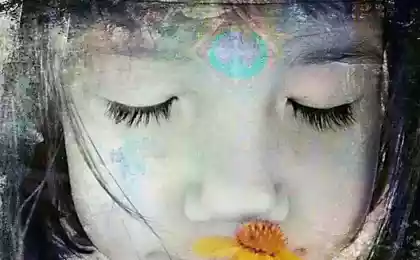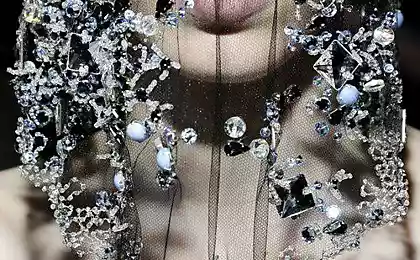626
Simpsion: the Soul can be mistress and slave
The nature of a phenomenon known as symbiosis — coexistence of organisms of different species, their biological interdependence.
This phenomenon remains largely a mystery to science, although it was discovered by the Swiss scientist S. Sindinero in 1877 while studying the lichens, which, as it turned out, are complex organisms consisting of algae and fungus. The same power of the indissolubility can act between people — mental, not a biological level.
Simpsion - mental interdependence of two or more individuals. They are mentally fixated on each other, experiencing the same sentiments, which are transmitted instantly from one to another. This simpsion happens between family members or a small community, for example, sect or party.
On the one hand, among them a growing sense of happiness, safety, security, verging on euphoria, and with those negative emotions, mutually resonating, can result in quarrels, to lead to a nervous breakdown.

There are different grades and stages of sympethise, until the complete emotional fusion of two beings, as in "old-world landowners", "the affection of their focus on themselves".
Simpsion can be psychologically beneficial to both parties, emotionally, to strengthen them, to increase resilience, resistance to external circumstances. Relationship partners may be equal or subordinate, i.e. more than one dependent, the other reigns — the case of sugar, which is molded to a stronger or powerful soul. This psychiary, or the soul-mistress, can protect the weaker, dependent soul, or to oppress her, to absorb her energy.
Simpsion can be beneficial to one but harmful to the other partner — then this relationship is called parasitism and vampirism. Parasitism is when a mentally weaker partner uses reservoirs of energy more powerful. Vampirism — when the more powerful partner is weak energy, weakening it even more.
Simpsion can be dangerous and destructive for both partners, even if they need each other and can't break this Union, as in the case of Nastasya Filippovna and Rogozhin, who can be neither together nor apart, and continue to psychologically torture each other. This negative simpsion often allowed death, murder or suicide.
Simpsion can bind three or more, which is manifested in the so-called "triangles" or "squares", multiple love unions, which include jealousy, rivalry, or generosity and self-denial. A case of sympethise describes Herzen in "Past and thoughts" — the ratio of two couples: the Hertz and Servegov, with their mental and pairwise cross-dependence, constant tantrums, victims, revenge. "We all got used – I can't imagine a more harmonious existence," wrote Natalie Herzen friend. But soon it cohabitation – quoted and unquoted — turned into hell...
A similar conflict can be noted in the history of the first marriage of Fyodor Dostoevsky: he was in love with his future wife, Maria Isaev, and she loved the teachers Vergunova, and the two rivals were crying to each other on the chest and sacrificially gave up the beloved for the happiness of the other.
Simpsion possible not only between individuals but also between the individual and the collective, leader and people, and their relationship can be painful for one or both parties. This type of sympethise depicted in the novel of T. Mann "Mario and magician", where a travelling magician holds a magic session and mentally subjugates the will of the spectators, while he morbosas it and sometimes falling into a trance. This mutual torture is interrupted by a shot — Mario takes revenge on the wizard for what he had committed psychological violence against him. You can draw a parallel between the two "simpletons": Rogozhin have Gostovskogo and Mario T. Mann. Both get rid of painful for them sympethise, sophisticated killing their oppressors, their psychomania.
Simplicity can grow as corals, in the whole mental colonies, as in the novels of Dostoevsky, where, for example, the father and the brothers Karamazov, Katerina Ivanovna, Grushenka, Lisa Khokhlakova, part of the family Snegirev, form a single simpsion, an intense field of empathy, emotional domination and slavery.
Simpsion election based on mental attractions of personalities, the mutual "bonding". There are personalities that are more prone to such entities, so to speak, a "sticky" and "dry" that repel any addiction. Duct the person is looking for any ways of psychotomimetic, both active and passive, it is guessed some mental gubitosi, the ability to absorb other people's psychoenergy or to pour your energy into others.
Sticky person emotionally envelops people and wittingly or unwittingly imposes on them the role of partners in intimate interactions. It can be dwuhvalentnoe or multivalent, depending on whether or not one partner for formation of a strong (constructive or destructive) of sympethize or she needs some partners who pass each other the energy of picholine and psychotomimetic and be firmly bound by this chain. In the center of psychosensorial can stand one person, forming a radial connection with its environment, or it may be a more pluralistic configuration, with multiple centers of attraction and repulsion.
One of the biggest options of sympethise - psychotrine, such a political regime, which is determined by the mental interaction of power and society. When the power does not remain other levers of influence: economic, cultural, constructive civilized, creative, social, she will use the suggestibility of the population to achieve their goals.
In the end, this interaction is transferred in a purely nervous stimulation and simulation, provoking mass hysteria, hysteria that puts the state on the brink of a nervous breakdown, hysterical collapse and accordingly, the historical catastrophe. While consumption is high and the depletion of mental resources and power, and companies that are emotionally experienced as mutual torment, as a competition of mental toughness — who have probably exhausted the patience.
Power as hysterical Nastasia, his bossy lover and yet mentally addicted to it, can provoke typical rogozinsky reaction: instantaneous transition from affection to physical violence as the only way the gap further unbearable sympethise.published
Author: Michael Epstein
P. S. And remember, only by changing their consumption — together we change the world! ©
Join us in Facebook , Vkontakte, Odnoklassniki
Source: www.chaskor.ru/article/simpsihoz_dusha_-_gospozha_i_rabynya_38506
This phenomenon remains largely a mystery to science, although it was discovered by the Swiss scientist S. Sindinero in 1877 while studying the lichens, which, as it turned out, are complex organisms consisting of algae and fungus. The same power of the indissolubility can act between people — mental, not a biological level.
Simpsion - mental interdependence of two or more individuals. They are mentally fixated on each other, experiencing the same sentiments, which are transmitted instantly from one to another. This simpsion happens between family members or a small community, for example, sect or party.
On the one hand, among them a growing sense of happiness, safety, security, verging on euphoria, and with those negative emotions, mutually resonating, can result in quarrels, to lead to a nervous breakdown.

There are different grades and stages of sympethise, until the complete emotional fusion of two beings, as in "old-world landowners", "the affection of their focus on themselves".
Simpsion can be psychologically beneficial to both parties, emotionally, to strengthen them, to increase resilience, resistance to external circumstances. Relationship partners may be equal or subordinate, i.e. more than one dependent, the other reigns — the case of sugar, which is molded to a stronger or powerful soul. This psychiary, or the soul-mistress, can protect the weaker, dependent soul, or to oppress her, to absorb her energy.
Simpsion can be beneficial to one but harmful to the other partner — then this relationship is called parasitism and vampirism. Parasitism is when a mentally weaker partner uses reservoirs of energy more powerful. Vampirism — when the more powerful partner is weak energy, weakening it even more.
Simpsion can be dangerous and destructive for both partners, even if they need each other and can't break this Union, as in the case of Nastasya Filippovna and Rogozhin, who can be neither together nor apart, and continue to psychologically torture each other. This negative simpsion often allowed death, murder or suicide.
Simpsion can bind three or more, which is manifested in the so-called "triangles" or "squares", multiple love unions, which include jealousy, rivalry, or generosity and self-denial. A case of sympethise describes Herzen in "Past and thoughts" — the ratio of two couples: the Hertz and Servegov, with their mental and pairwise cross-dependence, constant tantrums, victims, revenge. "We all got used – I can't imagine a more harmonious existence," wrote Natalie Herzen friend. But soon it cohabitation – quoted and unquoted — turned into hell...
A similar conflict can be noted in the history of the first marriage of Fyodor Dostoevsky: he was in love with his future wife, Maria Isaev, and she loved the teachers Vergunova, and the two rivals were crying to each other on the chest and sacrificially gave up the beloved for the happiness of the other.
Simpsion possible not only between individuals but also between the individual and the collective, leader and people, and their relationship can be painful for one or both parties. This type of sympethise depicted in the novel of T. Mann "Mario and magician", where a travelling magician holds a magic session and mentally subjugates the will of the spectators, while he morbosas it and sometimes falling into a trance. This mutual torture is interrupted by a shot — Mario takes revenge on the wizard for what he had committed psychological violence against him. You can draw a parallel between the two "simpletons": Rogozhin have Gostovskogo and Mario T. Mann. Both get rid of painful for them sympethise, sophisticated killing their oppressors, their psychomania.
Simplicity can grow as corals, in the whole mental colonies, as in the novels of Dostoevsky, where, for example, the father and the brothers Karamazov, Katerina Ivanovna, Grushenka, Lisa Khokhlakova, part of the family Snegirev, form a single simpsion, an intense field of empathy, emotional domination and slavery.
Simpsion election based on mental attractions of personalities, the mutual "bonding". There are personalities that are more prone to such entities, so to speak, a "sticky" and "dry" that repel any addiction. Duct the person is looking for any ways of psychotomimetic, both active and passive, it is guessed some mental gubitosi, the ability to absorb other people's psychoenergy or to pour your energy into others.
Sticky person emotionally envelops people and wittingly or unwittingly imposes on them the role of partners in intimate interactions. It can be dwuhvalentnoe or multivalent, depending on whether or not one partner for formation of a strong (constructive or destructive) of sympethize or she needs some partners who pass each other the energy of picholine and psychotomimetic and be firmly bound by this chain. In the center of psychosensorial can stand one person, forming a radial connection with its environment, or it may be a more pluralistic configuration, with multiple centers of attraction and repulsion.
One of the biggest options of sympethise - psychotrine, such a political regime, which is determined by the mental interaction of power and society. When the power does not remain other levers of influence: economic, cultural, constructive civilized, creative, social, she will use the suggestibility of the population to achieve their goals.
In the end, this interaction is transferred in a purely nervous stimulation and simulation, provoking mass hysteria, hysteria that puts the state on the brink of a nervous breakdown, hysterical collapse and accordingly, the historical catastrophe. While consumption is high and the depletion of mental resources and power, and companies that are emotionally experienced as mutual torment, as a competition of mental toughness — who have probably exhausted the patience.
Power as hysterical Nastasia, his bossy lover and yet mentally addicted to it, can provoke typical rogozinsky reaction: instantaneous transition from affection to physical violence as the only way the gap further unbearable sympethise.published
Author: Michael Epstein
P. S. And remember, only by changing their consumption — together we change the world! ©
Join us in Facebook , Vkontakte, Odnoklassniki
Source: www.chaskor.ru/article/simpsihoz_dusha_-_gospozha_i_rabynya_38506























